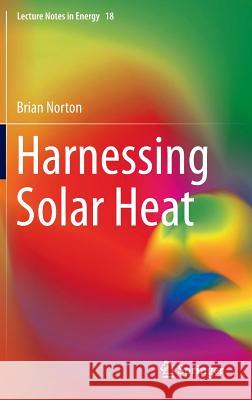Harnessing Solar Heat » książka
Harnessing Solar Heat
ISBN-13: 9789400772748 / Angielski / Twarda / 2013 / 258 str.
Systems engineered by man to harness solar heat in a controlled manner now include a diverse range of technologies each serving distinctive needs in particular climate contexts. This text covers the breadth of solar energy technologies for the conversion of solar energy to provide heat, either as the directly-used output or as an intermediary to other uses such as power generation or cooling. It is a wholly updated, extended and revised version of "Solar Energy Thermal Technology" first published in 1992. The text draws on the own author's research and that of numerous colleagues and collaborators at Cranfield University, University of Ulster, Dublin Institute of Technology, Indian Institute of Technology, Delhi and University of Nigeria.
The initial chapters deal with relevant fundamental aspects of solar energy meteorology, radiative heat transfer, material properties and energy storage. Solar energy collectors are discussed in detail before a set of chapters deal with each of the full range of applications. The early chapters consider: the solar energy resource, its distribution in geographical, spectral, skyward geometrical and temporal domains; the physics of solar energy absorption, transmission and loss at surfaces; and techniques for storing collected solar energy. Specific collector sub-systems are then discussed in chapters seven to nine. For each system, practical issues are discussed and a proven analytical procedure for predicting performance described. Similarly analyses are presented in the concluding chapters on solar energy systems. These range from dryers to greenhouses to systems that render buildings solar energy systems in themselves and the associated design issues.
The context for any use of solar energy is the prevailing climate. This text, being global in scope, definates the most appropriate regions for particular technologies and applications. It is a research-orientated academic work citing publications on the peer-reviewed literature covering engineering and applied science topics intended both for student use, as a reference tool for teaching solar energy and for those researching solar thermal applications in universities, industry or national/commercial laboratories. Insight into the challenges of implementation including practical constraints and operational considerations are provided to aid those undertaking feasibility studies, technical assistance, training assignments or operating testing facilities."











